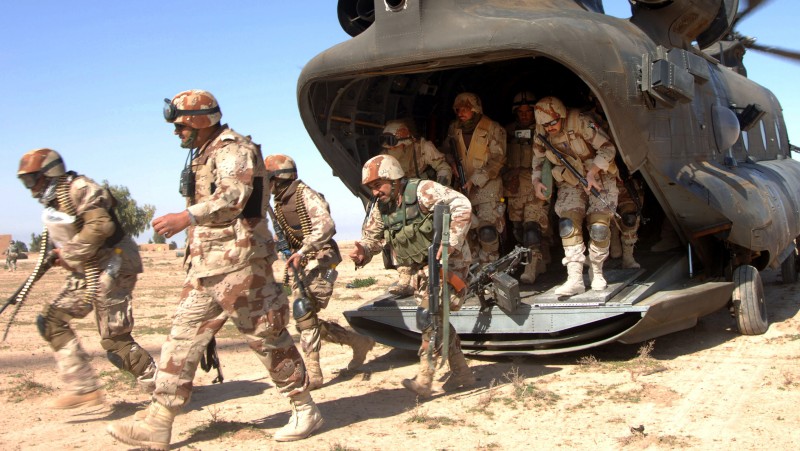
The long-awaited Chilcot report was released on Wednesday, detailing a years-long investigation into the U.K.’s role in the U.S.-led invasion of Iraq in 2003, with former Prime Minister Tony Blair facing accusations of war crimes.
At a press conference Wednesday morning, John Chilcot, chairman of the investigation, described his report as “an account of an intervention that went badly wrong, with consequences to this day.” Chilcot categorically stated that the war had not in fact been a “last resort,” and intellegence about Iraq’s weapons of mass destruction was presented “with a certainty that was not justified.”
Saddam Hussein was not an “imminent threat,” Chilcot added, noting that Blair had been warned that invading Iraq would actually increase the threat posed by extremist organizations such as al-Qaida.
He went on to explain that post invasion planing was “wholly inadequate,” and that Blair’s cabinet did not propertly discuss the implications of invading.
The massive report rejects Blair’s claim that post-invasion problems could not be predicted beforehand, with Chilcot arguing that the UK’s post-invasion efforts “never matched the scale of the challenge.”
The report states that the the U.S. and the U.K. undermined the authority of the United Nations Security Council by choosing to invade before peaceful options had been exhausted. Chilcot said that Blair overestimated his ability to influence the U.S. on decisions on Iraq.
As part of Chilcot inquiry, it was revealed that Tony Blair privately assured George Bush eight months before the invasion of Iraq that he would be support the former US president “whatever” as it related to dealing with Saddam Hussein.
Chilcot said that while the report did not rule whether or not the military invasion of Iraq was legal, the report showed that the “circumstances in which it was decided that there was a legal basis for U.K. military action were far from satisfactory.”
Chilcot explained that the invasion has had many harmful consequences, many of which continue today. “The people of Iraq have suffered greatly,” he said.
After the press conference Blair released a statement saying that “whether people agree or disagree with my decision to take military action against Saddam Hussein; I took it in good faith and in what I believed to be the best interests of the country.”
Blair said he would respond to the “serious criticisms” in detail later this afternoon.
The new findings were met by a wave of reactions from the country’s high-profile politicians, including Labour leader Jeremy Corbyn, a longtime critic of the Iraq war who said that the, “overwhelming weight of international legal opinion” says the invasion was illegal.
Corbyn went on to note that the decision to invade Iraq with what the report calls “flawed intelligence” has “led to a fundamental breakdown in trust in politics and in our institutions of government.”
“Chilcot’s report is damning for Blair, his cabinet and all those MPs who voted to take this country into an illegal and immoral war in Iraq. Iraqis continue to pay the price for an invasion that took place long before other options for a peaceful resolution were explored,” Green MP Caroline Lucas said in statement on Wednesday.
Meanwhile, Blair was called the “world’s worst terrorist,” by a woman whose brother was killed in the conflict on Sky News.
Many protestors gathered outside the Queen Elizabeth Center, in Westminster, where the report was presented. Groups protesting included the Stop the War Coalition and the Campaign for Nuclear Disarmament. Protesters were calling for Blair to be tried for war crimes, with many shouting “Bliar.”
“We have been saying for years that Blair was disregarding the U.N. and was in this hideous relationship with George Bush,” Lindsey German, convenor of the Stop the War Coalition told the Associated Press.
Meanwhile, the executive director of Greenpeace John Sauven also joined in the chorus of criticisms on Wednesday stating, “This report confirms what we already knew – that the Blair government led Britain into a disastrous war on a drumbeat of exaggerated threats, guesswork dressed as intelligence, and windy rhetoric.”
Current Prime Minister David Cameron said that we need to “really learn the lessons for the future,” following the report.
In 2009, Blair’s successor, Gordon Brown, ordered a judge-led inquiry into the lead-up and execution of the war in Iraq. Chilcot said he hopes that lessons will be learned from the the 12-volume report.
“The main expectation that I have is that it will not be possible in future to engage in a military or indeed a diplomatic endeavor on such a scale and of such gravity without really careful challenge analysis and assessment and collective political judgement being applied to it,” he told the BBC this week.
Blair vaguely apologized in Oct. 2015 for his “mistakes” in planning the war, but continued to insist that removing Hussein from power was the right thing to do. In 2015, Labour leader Jeremy Corbyn said that Blair should stand trial over the war, calling it an illegal invasion.
The report examined over 130 sessions of oral arguments, 150,000 documents and is around 2.6 million words long—about three times the length of the Bible.
The decision to invade Iraq was one of the most controversial British foreign policy decisions in decades. The Iraq war has seen an estimated 460,000 Iraqi civilians killed since 2003 and is credited with giving rise to sectarian extremist groups like the Islamic State group.

